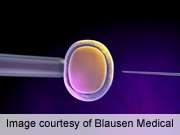(HealthDay)—For women undergoing assisted reproductive technology treatment, higher supplemental folate intake is associated with improved outcomes, according to a study published online Sept. 5 in Obstetrics & Gynecology.
Audrey J. Gaskins, Sc.D., from the Harvard School of Public Health in Boston, and colleagues conducted a prospective cohort study involving 232 women (median age, 35.2 years) undergoing assisted reproductive technology. The authors sought to examine the correlation of folate with outcomes. A validated food frequency questionnaire was used to assess diet before assisted reproductive technology treatment.
The researchers found that higher folate intake correlated with higher rates of implantation, clinical pregnancy, and live birth. With increasing quartile of folate intake, the adjusted percentage of initiated assisted reproductive technology cycles that resulted in a live birth increased (30, 47, 42, and 56 percent; P for trend = 0.01). For women in the highest versus the lowest quartile of supplemental folate intake, live birth rates were 20 percent higher. Higher fertilization rates (P for trend = 0.03) and lower cycle failure rates before embryo transfer (P = 0.02) were also seen in association with higher supplemental folate intake.
"Higher intake of supplemental folate was associated with higher live birth rates after assisted reproductive technology treatment," the authors write.
More information: Full Text (subscription or payment may be required)
Journal information: Obstetrics & Gynecology
Copyright © 2014 HealthDay. All rights reserved.






















